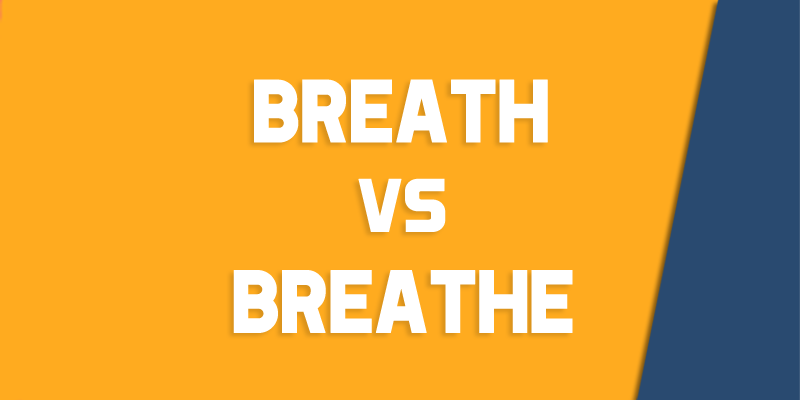Breath vs. Breathe – What’s the Gist?
These two English words share the related idea of the exchange of oxygen. One is the act. The other is the action.
- Breath is a noun.
- Breathe is a verb.
Knowing which part of speech you want is the key to spelling and using the chosen word properly.

How to Use Breath in a Sentence
Breath definition: Breath \brĕth\ with a short e sound is a noun, meaning the air inhaled into one’s lungs; a slight breeze; an utterance, or a brief moment in time.
For example:
- A breath of lavender floating through the open window hinted at spring’s arrival. (Noun)
- Because the new infant was so quiet, the young mother ran into the nursery to watch for a breath from her daughter. (Noun)
- The adolescent muttered under her breath about the stupidity of adults. (Noun)
A breath is what you take into your lungs when you breathe.
How to Use Breathe in a Sentence
Breathe definition: Breathe \brēth\ (with a long e sound) is the action of inhaling and exhaling.
As an intransitive verb, to breathe means to draw and expel air from the lungs; to blow softly; to pause before continuing; or to be free from restraint.
Remember, an intransitive verb does not have a direct object and simply expresses action.
For example:
- After her long run, the marathoner breathed deeply. (Past Tense Verb)
- The arguing couple decided they needed space from each other to be able to breathe. (Infinitive)
When the word breathe is functioning as a transitive verb, it means to inhale/exhale; to send out or take in; to express; or to expend a great deal of time, thought, and effort.
For example:
- The playing toddler breathed the fragrant air. (Past Tense Verb)
- After spilling the secret, the man said, “Don’t breathe a word to anyone.” (Present Tense Verb Phrase)
- The woman lived and breathed professional football. (Past Tense Verb)
- The doctor tried to breathe life into the ill patient using CPR. (Infinitive)
Keep in mind a transitive verb has a direct object and either passes action to the subject or to the direct object.
Outside Examples of Breath vs. Breathe
- Over the next several days my lung pain got worse, though I never ran a fever. I would feel short of breath after reading to the kids and lightheaded after getting up. Talking on the phone was like running a race. I have had one serious illness in my life and innumerable colds and flus; none of my symptoms resembled any of those past experiences. –The New York Times
- But at its heart, an ICU ventilator is a profoundly simple device. Here’s how it works: the patient is sedated enough to tolerate having a breathing tube secured in the trachea. The breathing tube connects to the ventilator by a hose. As the patient initiates a breath, the machine detects a slight drop in pressure, and a piston-driven cylinder pushes a measured volume of oxygen into the patient’s lungs. If the patient doesn’t or can’t start a breath, the machine will automatically do so after a few seconds. At some point, the machine either successfully delivers the required volume or reaches a maximum safe pressure and automatically cycles so that air can come back out of the patient’s lungs and through a separate hose. –The Boston Globe
- Authorities in Italy’s hardest hit region of Lombardy played an audio message recorded by the 38-year-old man in which he says, “You can get cured of this illness.” The man identified only by his first name of Mattia spent 18 days in intensive care on a respirator. After that time, he says he began to do on his own “the most simple and beautiful thing: that is, to breathe.” –Chicago Sun-Times
- Toomey encourages those filled with fear over the virus to use exercise as both a physical and spiritual balm. One of the best ways to fight the stagnation of home quarantine, she says, is to “continue to breathe and keep moving and use the medicine of that.” –The Dallas Morning News
Phrases That Use Breath and Breathe
There are many idioms that use the word breath or breathe; here are a few, including:
A breath of fresh air: Something or someone is a delightful or uplifting change.
- The arrival of the new girl was a breath of fresh air in the class.
A waste of breath: It isn’t worth the time and effort to explain something to someone who will not heed it.
- Telling the senior citizen to stay inside for his own health and safety was a waste of breath.
Breathe down (one’s) neck: Someone following and pressuring somebody else to do something.
- The teenager felt that his dad was breathing down his neck about taking out the trash.
To breathe fire: To be very angry.
- Watching too many people congregate closely in city parks caused the governor to breath fire at their behavior.
How to Remember These Words
These words are related but since they are different parts of speech, they have different functions in the sentence. The usual mistake is to use the word breath for breathe. It seldom works the other way.
In addition to understanding whether you need a noun or a verb, another way to distinguish which word to use is looking at the extra e in the word breathe.
More air to breathe is certainly better than less air to breathe. The two e letters found in the word breathe will help you remember to add the e for the verb.
Article Summary
Is breath or breathe correct? Remember to ask yourself which part of speech that you want. If you are looking for a noun, use the word breath. If you need to express an action, use the term breathe.
- Breath is a noun.
- Breathe acts as an intransitive and transitive verb.
